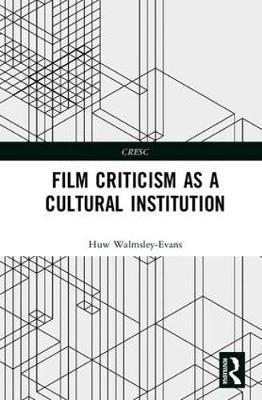Film Criticism as a Cultural Institution

Film Criticism as a Cultural Institution
Film Criticism as a Cultural Institution first examines the contemporary crisis conversation surrounding film criticism, comparing this to historical precedents. It then provides what today's crisis conversation does not: an account of film criticism's institutional formations. Using primarily U.S. and Australian case studies based on interviews, observation and archival research-as well as accounts from other national schools-the book maps contemporary film criticism. Across various sites, such as publications or online spaces, and organisations, such as film critics circles, it elucidates film criticism's institutional practices, tasks, comportments, and personae.
Looking at the history of conversations about film criticism shows us that "crisis" has always been a leitmotif. While acknowledging the considerable changes and challenges that film criticism faces today, this book situates these within an historical context and proposes an institutional framework that allows us to move beyond crisis discourse. Looking at film criticism in this way allows us to see that the very question of what counts as film criticism is continually contested within an institutional ecology made up of distinctive critical comportments addressed to distinctive audiences.
PRP: 884.00 Lei
Acesta este Pretul Recomandat de Producator. Pretul de vanzare al produsului este afisat mai jos.
795.60Lei
795.60Lei
884.00 LeiIndisponibil
Descrierea produsului
Film Criticism as a Cultural Institution first examines the contemporary crisis conversation surrounding film criticism, comparing this to historical precedents. It then provides what today's crisis conversation does not: an account of film criticism's institutional formations. Using primarily U.S. and Australian case studies based on interviews, observation and archival research-as well as accounts from other national schools-the book maps contemporary film criticism. Across various sites, such as publications or online spaces, and organisations, such as film critics circles, it elucidates film criticism's institutional practices, tasks, comportments, and personae.
Looking at the history of conversations about film criticism shows us that "crisis" has always been a leitmotif. While acknowledging the considerable changes and challenges that film criticism faces today, this book situates these within an historical context and proposes an institutional framework that allows us to move beyond crisis discourse. Looking at film criticism in this way allows us to see that the very question of what counts as film criticism is continually contested within an institutional ecology made up of distinctive critical comportments addressed to distinctive audiences.
Detaliile produsului









